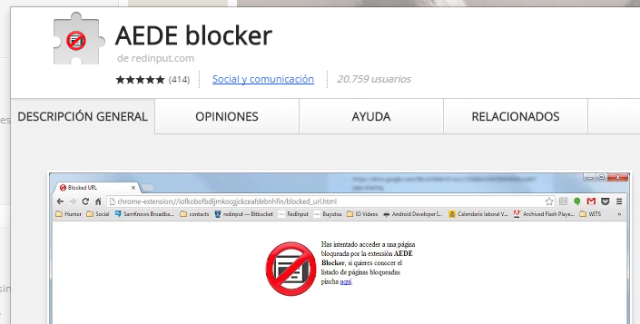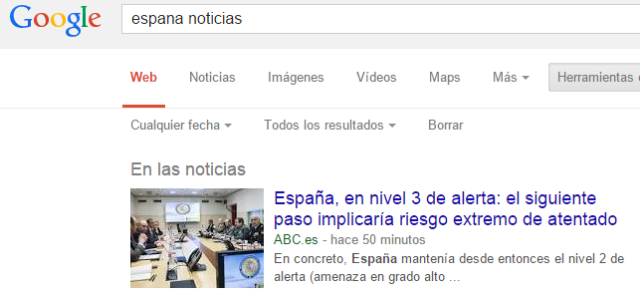Google isn't serving up headlines from Spain on Google News, and Spanish users can't access Google News at all. The reason: a Spanish law that requires Google to pay for the use of headlines.
Google's response: shutting down the service entirely. How did it get to this point?
Legislating Links
On December 16th 2014, Spain passed a law saying Spanish newspapers must be paid for content, even if they are willing to give it away for free. It sounds good for publishers – in fact, The Spanish Association of Daily Newspaper Publishers (AEDE - Asociación de Editores de Diarios) lobbied for it.
Traditional news publishers in Spain felt that Google benefits disproportionately from including their content – headlines and snipped – in Google News. The AEDE was pleased in 2012 when European Competition Commissioner Joaquin Almunia stated that Google is dominant in several markets and is abusing that dominant position.
"Google es dominante en varios mercados y está abusando de esa posición de dominio" - European Competition Commissioner Joaquin Almunia
As a result of the new law, Google News would be required to pay to include Spanish newspaper headlines in search results, or else face fines of up to €600,000. This law is now being colloquially referred to as 'the Google Tax' (even though it will affect other web aggregators, such as Bing and Yahoo).
As you probably guessed, Google doesn't pay to show headlines from any other country – and they're not about to start with Spain.
"This legislation requires every Spanish publication to charge services like Google News for showing even the smallest snippet from their publications, whether they want to or not. As Google News itself makes no money [...] this new approach was not sustainable." via https://support.google.com/news/answer/6140047#English
The result: Google News is offline in Spain, and doesn't show results from Spanish papers anywhere else.
Publishers were not prepared for the consequences.
The Reaction
Enrique Dans, an information technology and systems professor of the Instituto de Empresa (IE) Business School in Spain, published an article on Medium arguing that the Google tax is greedy, and irresponsible. Professor Dans predicts that the law will be impossible to enforce, and if it is used to chase small companies and individual journalists, would only hurt the field of journalism.
I just published "Spain vs. Google News: greed, incompetence, and an all round lack of principles" on @Medium | https://t.co/AWKx7jvLQD
— Enrique Dans (@edans) December 16, 2014
Global Voices Online reported that other Spanish Internet users slammed the decision.
"#Spain is a Corruptocracy": Netizens Slam Google News Tax http://t.co/3zrMFL04eE agreggators of news affected pic.twitter.com/xBUS8HGOcX — Global Voices (@globalvoices) December 17, 2014
Spanish speaking people have rallied behind hashtags like #EnlaceLibre (#FreeLinks), and #Todoscontraelcanon (#EverybodyAgainstTheFee).
Descargad esta extensión para no generar tráfico a AEDE. #EnlaceLibre #Todoscontraelcanon #CanonAede http://t.co/oTONhYeHQg
— Nico (@Navila1701) September 5, 2014
(Translation: Download this extension to not generate traffic to AEDE)
As the above tweet mentions, many are even boycotting AEDE publications with the use of browser extensions like AEDE Blocker.
Predictably, with Google News dropped from the wire of Spanish headlines, Spanish publications aren't seeing as much traffic as they used to. They lost anywhere from ten to fifteen percent of their regular traffic with the loss of Google News – and with it revenue.
Spanish news sites suffer after dropping Google News http://t.co/muPrceTPhZ pic.twitter.com/XkM67g83ON
— The Verge (@verge) December 17, 2014
Even the AEDE is backpedaling. AEDE said the closure of Google News "without a doubt will have a negative impact on citizens and Spanish companies", and called for authorities to get involved. "AEDE requires the intervention of the Spanish and EU authorities and the competition authorities to protect the rights of citizens and businesses."
Some Spanish lobbyists say that Spanish freedom of speech is being hurt by Google News not including links to their publications. They want Google to continue to continue to serve up Spanish headlines, and suggest that Google could 'negotiate the fee'.
This is nonsense. It would be unfair and illogical to force a private company to provide a service and charge that company for it (negotiation or not).
Search Results the "Google Tax" Law Doesn't Affect
As Danny Sullivan of SearchEngineLand explains, Spanish articles aren't completely missing from Google – just from Google News. While readers won't just be presented with all the news of the day, news articles are being inserted into ordinary search results when relevant. They're being presented within search results under the headline En las noticias, meaning "In the news".
How You Can Access Spanish News
If you are looking for news in Spanish on a particular topic, you can run your search in the ordinary search box (also known as Google Universal Search), and then narrow down results to Noticias (news) content.
Other Cases of Restricted Searches
France, Belgium, Germany, and Portugal have all considered similar laws, SearchEngineLand reports. For example: in 2012 Germany implemented 'ancillary copyright' for publishers, but ended up permitting 'very small excerpts of text' to be shown for free, – giving Google some leeway in presenting snippets in news searches.
All four of these other nations have worded their law such that a publisher can demand payment, but is not required to – a key difference from Spain's approach.
Final Thoughts
I can hardly believe it's not obvious to everybody: the relationship that Google has with web content creators has always been reciprocal and mutually beneficial. The Internet would be a very different place without search engines freely linking to all the content their robots can find - it's hard to imagine being able to find sites without them.
That said, any web content creator who wants to opt out of having their content linked to should be free to do so, and they can. There are lots of easy ways to hide your content from robots. Europeans can even request that Google remove links to sites about you that you don't like under the Right to Be Forgotten (another law that comes from Spain).
If you just don't like big businesses like Google benefiting from ad revenue from your searches or tracking you, you can also opt-out by using a different search engine, like DuckDuckGo.
Do you think search engines benefit more than they ought to from the work of web content creators, or are they providing a service we all need? What kind of relationship would you like to see search engines have with web creators? Should search engine inclusion be perhaps opt-in instead of opt-out?



